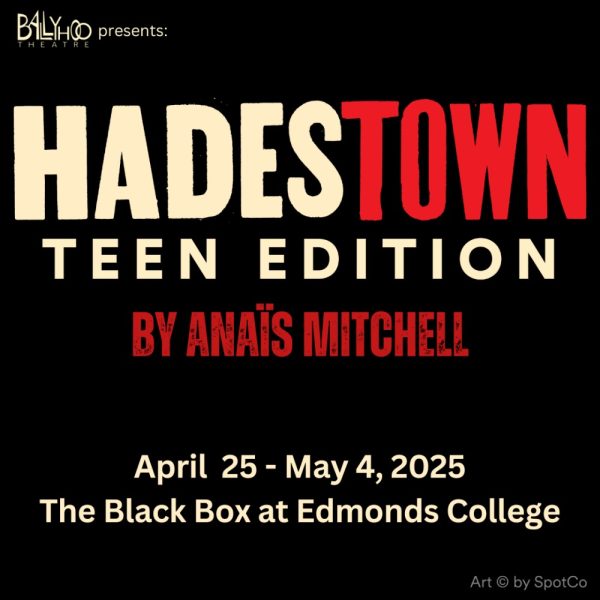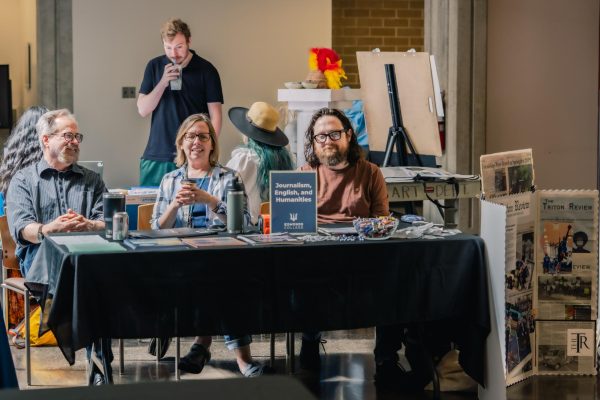Senate Faculty’s fight for student and teacher rights
Unbeknownst to many students and long-overlooked by Edmonds Community College administration, a powerful community of teachers have begun to speak up and demand a voice within the decision-making at the school as of the last few years.
Now more than ever, they’re tackling an expansive list of issues across campus, including sustainability, student fees, how the college can react and interact with student-led activism, and the treatment of part-time teachers.
Founded in spring of 2015, the Faculty Senate is a broadly-defined governing body at EdCC which aims to “foster a community of mutual respect and cooperation within the college; to facilitate effective faculty participation in academic governance; to broaden communication in matters of concern to the college; and to engage the faculty’s skills in the guidance of the college’s programs,” according to the Senate Charter.
Ann Paulson, an At Large member of Faculty Senate Council and long-time business management teacher at EdCC, noted that this senate differs from other colleges in the sense that they want to be more broad-reaching.
“We don’t want to just be involved in faculty-only issues, like curriculum, and classes, and stuff like that,” Ann explained. “We want to be involved in the whole campus.”
In particular, the Faculty Senate want to be involved “from the beginning” of decision-making, rather than asked for input at the final stages of EdCC project-planning which can have long-lasting impacts on the college. This was reiterated by multiple members of the Faculty Senate, including David Breed, John Baumgartner, Ann Paulson, and Mary Whitfield.
A major concern that the Faculty Senate has been working to amend is how associate faculty are treated on campus: Associate faculty are teachers which are hired to teach at the school on a quarterly basis, in contrast to full-time teachers, who teach with a year-long contract. The difficulty with this system is that associate faculty are not tenure-protected; and are not guaranteed a job.
“70 percent of our classes are being taught by people who are not given any assurance at all of employment.”
-Ann Paulson, Faculty Senate Council
“If their classes cancel, they don’t have a job,” explained Paulson. “If there’s not enrollment for students, or if there’s a full-time faculty that has a class canceled, they can go bump that part-time faculty and take their class, which means part-time faculty doesn’t have an income.”
The term “part-time,” Paulson mentioned, is actually a poor descriptor for the work that associate faculty do. Not only do they sometimes teach as many classes as full-time faculty, but also aid students outside of class.
“It’s just a two-tiered, hierarchical faculty system,” said John Baumgartner, currently an At Large Council Representative and english professor at EdCC.
But without an office or paid office hours, they instead volunteer their time outside of the classroom to help their students succeed.
“I get office hours, so I can meet with students all the time,” Paulson said. “Anytime that I get to the mid-quarter of my class, I look at who’s not getting the grade they wanna get, and I send them an email and say, ‘you need to come in and visit me and we’re gonna fix this.’ And I can do that because I have an office. I get paid for office hours.
“Whereas associate faculty, they kind of share offices, and its not permanent… so they don’t get paid for office hours at all. So if a student is having trouble in a class, they have to talk in a hallway, y’know, which isn’t good for anybody.”
EdCC has about 510 associate faculty, or 72 percent of the entire teaching staff on campus. “So 70 percent of our classes are being taught by people who are not given any assurance at all of employment,” said Paulson.
More so, the implications of what’s at risk for those individual teachers is alarming: A recent survey taken by the Faculty Senate discovered that roughly two-thirds of associate faculty rely on having their job at the college to make ends meet, and don’t have a second job to fall back on. If they end up jobless for a quarter or more, they could be in potentially extreme financial stress, and could also lose their healthcare or other benefits.
At the inception of the Faculty Senate, Baumgartner partnered with Marsha Woodard, the Associate Faculty representative for the union. Together they formed the Associate Faculty Council Committee, designed to tackle issues specific to this community.
“One of the first things I did was work to try to institutionalize or provide a forum for problems that part-time faculty have,” he explained.
Baumgartner was eventually hired as full-time faculty, but his long-time experiences as associate faculty are fresh on his mind. “I felt really lucky, because it happened so rarely.”
Although he has stepped down from the Associate Faculty Council, he still cares deeply about the issues those teachers face.
The Associate Council has made progress in improving things at the college; Baumgartner notes the council’s work streamlining and regulating the process of applying for a Senior Associated Faculty position, which had previously had a “gross inequity” in how people would apply for the position.
He also noted the development of the associate dean of instruction position, which the associate council had an impact on redefining. “There was concern that they were institutionalizing a ‘watchdog’ to look over associate faculty, rather than address the core issue, which is trying to curve that imbalance between part-time and full-time faculty. So that was one of the things kind of motivating us to form the committee: to raise these issues and talk about them.”
The redefined job position, after the associate council’s progressive pushes for change, required the upcoming dean of instruction to meet regularly with the teachers to discuss and listen to their concerns.
Elisabeth Fredrickson, the new associate dean for part-time faculty, was an associate faculty member for 13 years as an English instructor.
“Many times associate faculty don’t have as much access to information or resources as full-time faculty, because of odd hours or not always being on campus,” Fredrickson says. “It’s especially important to have someone who can support them and make sure they have what they need to teach effectively.”
Fredrickson’s job is to assist with instructional initiatives, teaching practice, and professional development, while accommodating and working with associate faculty.
But there’s still much work to be done. Baumgartner states that the associate council want to work with the college to develop a more reliable way of scheduling part-time faculty for classes, and creating easier pathways for those instructors to apply for tenure.
Faculty senate also wants to continue developing a better system for student fees. Mary Whitfield, EdCC chemistry teacher and currently in her first-term on the Faculty Senate, explained that while tech fee costs have gone up for students, the actual funds needed have diminished, and therefore the money students are giving are being funneled into other aspects of the college’s budget.
Faculty Senate want greater accountability on the part of the college on behalf of students, so that the community knows what they are paying for. More so, with a better understanding of where that money needs to go, the college will be able to better accommodate for different classes and departments, and eventually may understand where those fees can be diminished for students.
The college administration has improved upon its inclusion of Faculty Senate in recent discussions and decision-making. For example, Faculty Senate met with finalists for the EdCC Presidential election in winter quarter, 2018. This allowed Faculty Senate to interview candidates and have a voice in decision-making.
“We were approached by the Human Resources director, Dennis Curran, and invited as a Senate Council to hold our forums with the 3 college president finalists,” noted President of Senate Faculty, David Breed.
“This is a big deal to us because…the Senate Council specifically crafted a resolution that was unanimously voted upon by the faculty to say we wanted a stronger faculty voice in the college president search.”
Over time, Faculty Senate hope to have even more ability to make positive change within the community, for both faculty and students.
“I think for the Faculty Senate, one of the most rewarding moments is working with students, and our teachers,” Baumgartner said. “We enjoy interacting with students. And that dialogue between students and faculty is one that we need to keep connected. And I think Faculty Senate offers a forum for that.”









